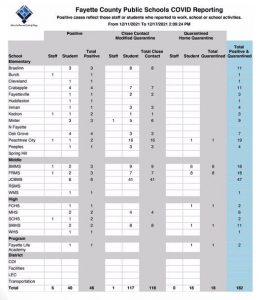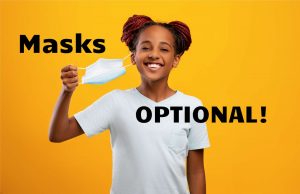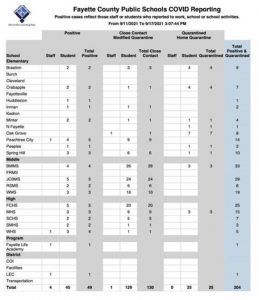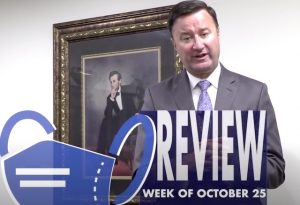A public speaker at the Aug. 24 meeting of the Fayette County Board of Education took issue with the recent decision to purchase thermal imaging/facial recognition cameras to be installed in schools to detect fevers. He cited concerns over privacy, limited use during the pandemic, the $500,000 cost of the equipment and the need for government to share in the suffering faced by property owners and the private sector.
The school board on Aug. 10 approved the purchase of up to 75 Hikvision cameras, at an installed price of $7,000, for a maximum of $525,000. The purchase will be made using ESPLOST (education special purpose local option sales tax) safety and security funds.
Speaking during the public comments portion of the meeting, Mike Coley spoke on the school board’s recent approval to purchase and install facial recognition cameras in schools, which will be used to take the temperature of those entering the buildings and identify those individuals with a fever.
“If the facts are correct, apparently the school board is purchasing these to put in the schools for the students for, supposedly, the safety of the students to take the temperature as they come in,” said Coley. “But it’s also about facial recognition of the students, which to me, borders on privacy issues. You’re going to be taking facial recognition of all these students, storing these images somewhere. God knows, we know how insecure government data is with the internet and everybody willing to share that information. So I think a lot of privacy issues are a concern here.”
Coley referenced the potential for years of data storage through the camera system, which he again said could present privacy issues which could lead to lawsuits.
Coley maintained that the camera manufacturer is a Chinese company that has been banned by federal government, and asked who made the decision to purchase the cameras.
“I don’t think this should have been done. I think it should have been discussed further before any decision was made,” said Coley. “And frankly, I don’t think we need these cameras. I think this could have been handled with temperature guns. Because after this virus is done with, we’re not going to have any use for these temperature cameras that y’all are wanting to spend nearly half a million dollars on.”
Making a follow-up point, Coley noted the financial aspect of obtaining the cameras.
“This is only going to be used during the Chinese virus. After it goes away there’s really no use for this to happen,” said Coley, adding that, “Half a million dollars is a lot of money to spend. You’re getting ready to raise our taxes on our property. People are suffering out here. People are getting jobs cut back, our savings are going away. We can’t pay our mortgages hardly. We can’t pay our bills.
“I know this isn’t because of you guys — the government has decided to shut down the economy over something that has a 98.9 percent survival rate,” Coley continued. “The majority of those who die from this are 70 years old or older and have pre-exiting conditions, but yet we’re shutting down the economy for this. Everybody, including you guys, city councils, mayors, state representatives, the governor, all need to take a pay cut. If you’re going to make us suffer, you guys need to suffer, the government needs to suffer. The private sector is taking the brunt of all this. And again, a $500,000 (camera) figure. How can you justify raising our taxes?”
Responding to Coley’s comments after the meeting, school system spokesperson Melinda Berry-Dreisbach said, “In an effort to help keep students, staff and visitors healthy, Fayette County Public Schools have purchased thermal cameras to screen for fevers as persons enter its schools. An elevated temperature is one way to identify a person who may have a COVID-19 infection, according to the U.S. Food and Drug Administration’s webpage on temperature assessment devices.
“The cameras are being used to solely check body temperatures, and not for any other identifying purpose. Due diligence has been conducted to ensure that temperature readings captured by the cameras are being stored only on the school system’s network, and for a limited time, in order to protect the privacy of students, staff and visitors.
“The school system already has security cameras installed in its school buildings, school hallways, and on school buses. However, these cameras do not record body temperature. No cameras are installed for recording daily classroom activities or other personally identifiable information such as name, sex, age, etc. The Hikvision cameras will only be used to measure an individual’s temperature to help eliminate the spread of COVID-19 and other viruses that may cause fever.
“The school system worked with its longtime security vendor, Ultimate Security of America, Inc., to purchase the Hikvision cameras. Ultimate Security is an authorized dealer for Hikvision like many other security vendors across the country that work with local and state agencies, organizations and private businesses.
“School systems in Georgia and in other states (North Carolina and Alabama) have purchased Hikvision equipment for body temperature screenings as their schools open for the 2020-2021 school year. In fact, some well-known businesses in the United States are users of Hikvision equipment including Coco-Cola, FedEx, Dominos, Enterprise Car Rental, Dave and Busters, Auto Zone and Pruitt Healthcare.
Billy Griffth, president of Ultimate Security, says that Hikvision is the most advanced and accurate thermal camera on the market today, according to Berry-Dreisbach.
“I personally contacted several locations in my research, in addition to four supply distribution centers, to make sure that Hikvision still had the reputation that I am familiar with, and my research confirmed it,” said Griffth.
Pertaining to Coley’s assertion about Hikvision being banned, an article appeared at www.ipvm.com on July 13 entitled “Ban rules released: Use Dahua or Hikvision, No U.S. government contracts.” IPVM characterizes itself as the world’s leading video surveillance information source.
“The U.S. government has released the rules implementing the ‘Prohibition on Contracting with Entities Using’ Dahua, Hikvision, and Huawei based products. This is the so-called ‘blacklisting’ clause and follows the GSA ordering government contractors to immediately remove Dahua and Hikvision products. This new 86-page regulation is technically marked as an ‘interim’ and ‘prepublication’ though the government is not even accepting comments on this until after the official version is published,” according to the article.
The ban was to go into effect 1 month from today, on Aug. 13, the article said.
Additionally, a March 5 article in www.businessinsider.com noted that Hikvision and Dahua were placed on the Department of Commerce’s entity list in 2019, “over allegations that they were involved in human-rights abuses in Xinjiang, where the Chinese government has pursued a campaign of imprisonment and persecution against the predominantly Muslim Uighur minority.”













Leave a Comment
You must be logged in to post a comment.